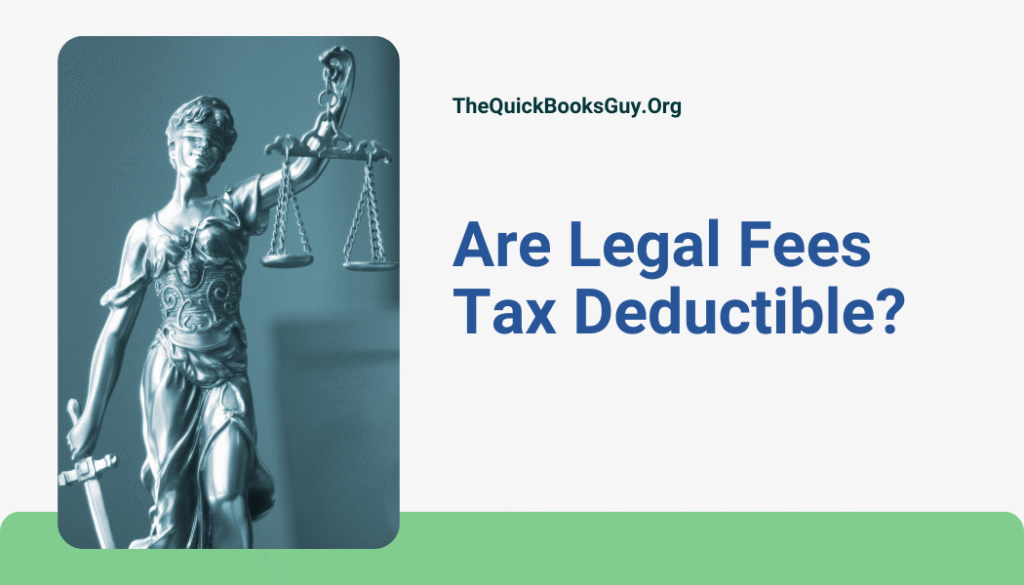
Legal fees are the charges you pay for legal services, which can include anything from consultation to representation in court. These fees can accumulate quickly, making it important to understand whether they are tax deductible. Legal fees can also encompass a wide range of services, including drafting legal documents, providing legal advice, and negotiating settlements. The scope and nature of these services can vary greatly depending on the type of legal assistance required.
In general, legal fees are categorized based on the purpose they serve. For instance, fees incurred for personal matters such as family law issues differ from those related to business operations or tax matters. This distinction is crucial when determining tax deductibility. Understanding these categories can help taxpayers better organize their financial records and make informed decisions when seeking legal services.
So, Are Legal Fees Tax Deductible?
When it comes to deducting legal fees, the situation can be complex. In general, legal fees may be deductible if they are related to earning taxable income, managing or conserving income-producing property, or getting tax advice. However, personal legal fees are typically not deductible. Here’s a closer look at the different scenarios that influence deductibility.
Legal Fees for Individuals
For individuals, legal fees that are related to personal matters are not deductible. This includes fees for things like divorce, child custody, personal injury lawsuits, and criminal defense. The rationale behind this is that these expenses are deemed personal and not directly tied to income generation.
However, there are exceptions. If legal fees are incurred in connection with earning taxable income, such as fees related to employment disputes or protecting one’s reputation, they may be deductible. Nonetheless, distinguishing between personal and income-related legal expenses requires careful assessment and, often, expert advice.
Legal Fees for Business
If you own a business, you may be able to deduct legal fees that are necessary and ordinary expenses directly related to operating your business. This can include fees for drafting contracts, handling business transactions, or defending against lawsuits related to your business operations. Such fees are considered part of the cost of doing business and are generally deductible.
Moreover, legal fees associated with regulatory compliance, intellectual property protection, and employment law issues are also typically deductible for businesses. Keeping detailed records of these expenses is crucial to support your deduction claims and to ensure they are accurately reported in your tax filings.
Legal Fees for Tax Advice
Legal fees incurred for tax advice related to a business or to the production of income may be deductible. This includes fees paid for tax planning or representation in a tax audit. These fees are often seen as necessary expenses to ensure compliance and optimize tax positions.
However, it’s important to separate tax advice fees from other non-deductible legal expenses. Accurate classification and documentation are vital, as the IRS scrutinizes these deductions closely. Consulting with a tax professional can provide clarity and help in accurately reporting these expenses.
Understanding Deductible vs. Non-Deductible Legal Fees
To better understand which legal fees are deductible, it’s essential to distinguish between personal and business-related expenses. Here’s a breakdown:
Deductible Legal Fees
- Business-related Legal Fees: Fees that are necessary for your business operations, such as contract reviews and legal advice directly related to your business. These expenses are seen as integral to maintaining and growing your business.
- Tax-related Legal Fees: Fees for tax planning and advice, if they are related to your business or income-producing activities. These deductions ensure that businesses and individuals manage their tax liabilities effectively.
- Employment-related Legal Fees: If you incur legal fees related to collecting taxable income such as wages or salary, these may be deductible. This is often applicable in cases of employment disputes or wrongful termination claims.
Non-Deductible Legal Fees
- Personal Legal Fees: Legal fees related to personal matters, including divorce, personal injury claims, and criminal defense, are generally not deductible. These are considered personal expenses not tied to income generation.
- Capital Expenses: Legal fees that are considered capital expenses, like those related to the purchase of property, are not immediately deductible but may be added to the property’s cost basis. This means they can potentially reduce capital gains tax when the asset is sold, but they don’t offer immediate tax relief.
Are Legal Fees Tax Deductible for Criminal Defense?
Legal fees for criminal defense are generally considered personal and are not tax deductible. This holds true even if the charges are related to your business activities. The IRS considers these fees personal expenses, which are not deductible under current tax laws. The reasoning is that criminal activities are not part of legitimate business operations or income-producing activities.
Even if the outcome of the criminal case has significant implications for one’s business, the associated legal fees remain non-deductible. It’s important for individuals to understand this distinction to avoid potential issues with tax filings and ensure compliance with IRS regulations.
How to Claim Deductible Legal Fees
If you determine that your legal fees are deductible, here’s how to claim them on your taxes:
Business Expenses
For business-related legal fees, you can claim them as a business expense on your business tax return. These expenses should be reported on Schedule C (Form 1040) if you are a sole proprietor or in the appropriate section of your corporate tax return if you operate a corporation. Proper documentation and accurate reporting are essential to substantiate these deductions.
In addition, maintaining organized records of all legal fees, including invoices and payment receipts, can help in case of an audit. It’s advisable to consult with a tax advisor to ensure that all business expenses are correctly categorized and reported.
Miscellaneous Deductions
Prior to the Tax Cuts and Jobs Act of 2017, individuals could deduct miscellaneous itemized deductions, including certain legal fees, if they exceeded 2% of their adjusted gross income. However, this deduction has been suspended for tax years 2018 through 2025. As a result, individuals have fewer opportunities to claim deductions for personal legal fees, highlighting the importance of understanding the current tax landscape.
Despite these changes, taxpayers should stay informed about potential legislative updates and consider consulting a tax professional to explore any available deductions or credits that may apply to their situation.
Examples of Deductible and Non-Deductible Legal Fees
To put it all together, here are some examples:
Deductible
- A freelance graphic designer paying legal fees to draft client contracts. This expense is directly tied to their business operations and income generation.
- A business owner paying for legal advice related to a tax audit. Such fees are considered essential for managing tax liabilities effectively.
- An employee paying legal fees to collect unpaid wages. These fees are directly related to earning taxable income and can be deductible.
Non-Deductible
- A taxpayer paying legal fees for a divorce settlement. These are considered personal expenses and not related to income production.
- An individual paying legal fees for a personal injury lawsuit. Such fees are personal and not deductible under current tax law.
- A business owner paying legal fees for a criminal defense case. Despite its impact on the business, these fees remain non-deductible.
Conclusion: Navigating Legal Fee Deductions
Understanding the rules around tax deductions for legal fees can help you save money and avoid potential pitfalls. While some legal fees can be deducted, many personal legal fees do not qualify. It’s important to carefully track your legal expenses and consult with a tax professional to ensure you are accurately reporting them on your tax return.
By knowing what is deductible, you can make informed decisions and potentially reduce your tax liability. Always consider seeking advice from a qualified tax advisor to navigate the complexities of tax law and make the most out of your deductions. Staying informed and proactive in managing your legal expenses can lead to better financial outcomes and compliance with tax regulations.
About The Author
Are you learning to navigate Quickbooks but need a little help? James Wegener, the CEO of The QuickBooks Guy, LLC, is here to guide you every step of the way. With over 20 years of experience in bookkeeping and a deep understanding of financial software solutions, James is the go-to expert for those seeking to optimize their financial operations.
Don’t let bookkeeping challenges hold you back any longer. Reach out today at 678-923-5904 or drop an email to TheQuickBooksGuy@gmail.com.
It’s time to get your books done right!




